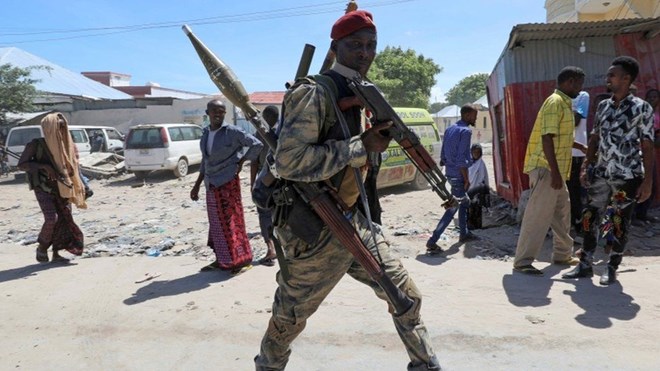Wednesday July 7, 2021
BY IBRAHIM MOHAMED AND VAHE MIRIKIAN
PHOTO/ REUTERS
Somalia’s Prime Minister Mohamed Hussein Roble unveiled the timetable for indirect parliamentary and presidential elections. The timetable schedules elections for the upper house to take place on July 25 and the lower house between August 10 and September 10. Afterward, both houses will convene to vote for the presidency on October 10.
The delayed election comes at a tense time and could spiral into widespread violence unless more is done to address the root causes of violence. Since the formation of the Somali National Movement in the 1980s, violence in Somalia has become the norm. Whether it is violent attacks by al-Shabaab, civilian deaths from U.S. drone strikes, the government firing on protesters, or the failure of AMISOM to protect civilians, violence continues to be a daily reality for the people of Somalia.
The international community has long provided aid and tried to facilitate peace negotiations. The location of Somalia in the Horn of Africa makes the country of geostrategic interest for the international actors involved. Countries with competing interests provide support because a stable and peaceful Somalia will bear more significant opportunities for economic development in the region and the world.
The United States has been engaged militarily in Somalia since 2007. Its efforts have been primarily focused on its counterterrorism campaign against al-Shabaab. Earlier this year, the United States ended its military presence in the country, but its airstrikes continued at an alarming rate until the Biden administration stopped all airstrikes this year. According to U.S. Africa Command, the United States conducted 52 airstrikes in 2020, 63 in 2019, 47 in 2018, and 35 in 2017. These airstrikes resulted in multiple civilian casualties, which remain underreported by the United States Defense Department.
Competition for power and resources continues to be a leading cause of conflict among and between clans and militia groups. Almost all federal state processes are still driven by clan elders and elites, with little meaningful involvement from minority groups or the wider public. For the last two decades, different clan factions and armed groups vie to control this resource-rich port city and its surrounding areas. Additionally, government ministers lack experience in governing because they are often selected along clan lines, which results in federal administrations with low legitimacy and deepening inequalities between different social groups.
To address the violence in Somalia, high-level peace processes or continued armed interventions are not enough. Local civil society and peacebuilding actors must actively contribute to efforts to reconcile past divisions, rebuild traditional conflict management institutions, and end cycles of violence.
Due to the complex and fragmented nature of the conflict in Somalia, a localized and highly contextualized approach is necessary. Local peacebuilders — civil society actors working at the grassroots level across conflict-affected areas in Somalia — play an essential role. They have a nuanced understanding of the complex and multifaceted issues plaguing the country. Local peacebuilders’ established relationships with clan elders, government officials, and other militia groups are an invaluable resource for peacebuilding. They can play the role of mediators to deescalate local conflicts and bolstering initiatives by clan elders and the government. Investing in locally designed, led and implemented peacebuilding initiatives is a proven and sustainable path forward.
Often overlooked as a part of the solution, women and youth constitute most of the Somali population. A Peace Direct report, where one of us works, in 2019 found that women know their agency for peace is greatest when it is collective, but they are often unable to access the social institutions available to men. Similarly, young people are often scapegoated as perpetrators of violence. Somali organizations like the Social-life and Agricultural Development Organization (SADO), where one of us serves as interim executive director, are countering that narrative by empowering women and youth to participate in political and decision-making processes.
During the COVID-19 pandemic, local organizations like SADO mobilized to focus on host and internally displaced communities to reduce the spread of misinformation and support those who have been affected by violence and drought. Many more local civil society and peacebuilding organizations lead initiatives that contribute to peace and stability around the country.
Even with many local Somali organizations working to address the cycles of violence in the country, local civil society remains overlooked. The international community and private foundations must tap into and invest in local organizations. Their understanding of local issues and existing relationships with key stakeholders are essential resources for addressing and reducing violence in Somalia. It is vital that local peacebuilding initiatives are supported alongside efforts to establish state authority, bringing state and community action together.
Given the presence of al-Shabaab and civil militia groups, a military approach is a conditioned reflex in Somalia. However, decades of violence have proven this approach does not work. A different approach is needed to stop the ongoing cycles of violence and forge a path to stability in Somalia. Local peacebuilders must take the lead.
Ibrahim Mohamed is the interim executive director of Social-life and Agricultural Development Organization (SADO) based in Somalia. SADO seeks to improve the living conditions of vulnerable communities in the Horn of Africa by facilitating relief and sustainable development programs.
Vahe Mirikian is the assistant director for U.S. Policy at Peace Direct, an international organization working with local peacebuilders to end violent conflict. Follow him on Twitter @vahemirikian.